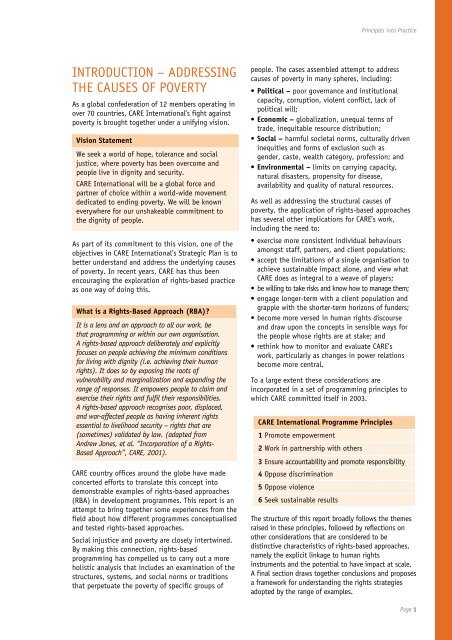Principles into Practice - Handicap International
Principles into Practice - Handicap International
Principles into Practice - Handicap International
- No tags were found...
You also want an ePaper? Increase the reach of your titles
YUMPU automatically turns print PDFs into web optimized ePapers that Google loves.
<strong>Principles</strong> <strong>into</strong> <strong>Practice</strong>INTRODUCTION – ADDRESSINGTHE CAUSES OF POVERTYAs a global confederation of 12 members operating inover 70 countries, CARE <strong>International</strong>’s fight againstpoverty is brought together under a unifying vision.Vision StatementWe seek a world of hope, tolerance and socialjustice, where poverty has been overcome andpeople live in dignity and security.CARE <strong>International</strong> will be a global force andpartner of choice within a world-wide movementdedicated to ending poverty. We will be knowneverywhere for our unshakeable commitment tothe dignity of people.As part of its commitment to this vision, one of theobjectives in CARE <strong>International</strong>’s Strategic Plan is tobetter understand and address the underlying causesof poverty. In recent years, CARE has thus beenencouraging the exploration of rights-based practiceas one way of doing this.What is a Rights-Based Approach (RBA)?It is a lens and an approach to all our work, bethat programming or within our own organisation.A rights-based approach deliberately and explicitlyfocuses on people achieving the minimum conditionsfor living with dignity (i.e. achieving their humanrights). It does so by exposing the roots ofvulnerability and marginalization and expanding therange of responses. It empowers people to claim andexercise their rights and fulfil their responsibilities.A rights-based approach recognises poor, displaced,and war-affected people as having inherent rightsessential to livelihood security – rights that are(sometimes) validated by law. (adapted fromAndrew Jones, et al. “Incorporation of a Rights-Based Approach”, CARE, 2001).CARE country offices around the globe have madeconcerted efforts to translate this concept <strong>into</strong>demonstrable examples of rights-based approaches(RBA) in development programmes. This report is anattempt to bring together some experiences from thefield about how different programmes conceptualisedand tested rights-based approaches.Social injustice and poverty are closely intertwined.By making this connection, rights-basedprogramming has compelled us to carry out a moreholistic analysis that includes an examination of thestructures, systems, and social norms or traditionsthat perpetuate the poverty of specific groups ofpeople. The cases assembled attempt to addresscauses of poverty in many spheres, including:• Political – poor governance and institutionalcapacity, corruption, violent conflict, lack ofpolitical will;• Economic – globalization, unequal terms oftrade, inequitable resource distribution;• Social – harmful societal norms, culturally driveninequities and forms of exclusion such asgender, caste, wealth category, profession; and• Environmental – limits on carrying capacity,natural disasters, propensity for disease,availability and quality of natural resources.As well as addressing the structural causes ofpoverty, the application of rights-based approacheshas several other implications for CARE’s work,including the need to:• exercise more consistent individual behavioursamongst staff, partners, and client populations;• accept the limitations of a single organisation toachieve sustainable impact alone, and view whatCARE does as integral to a weave of players;• be willing to take risks and know how to manage them;• engage longer-term with a client population andgrapple with the shorter-term horizons of funders;• become more versed in human rights discourseand draw upon the concepts in sensible ways forthe people whose rights are at stake; and• rethink how to monitor and evaluate CARE’swork, particularly as changes in power relationsbecome more central.To a large extent these considerations areincorporated in a set of programming principles towhich CARE committed itself in 2003.CARE <strong>International</strong> Programme <strong>Principles</strong>1 Promote empowerment2 Work in partnership with others3 Ensure accountability and promote responsibility4 Oppose discrimination5 Oppose violence6 Seek sustainable resultsThe structure of this report broadly follows the themesraised in these principles, followed by reflections onother considerations that are considered to bedistinctive characteristics of rights-based approaches,namely the explicit linkage to human rightsinstruments and the potential to have impact at scale.A final section draws together conclusions and proposesa framework for understanding the rights strategiesadopted by the range of examples.Page 1

















